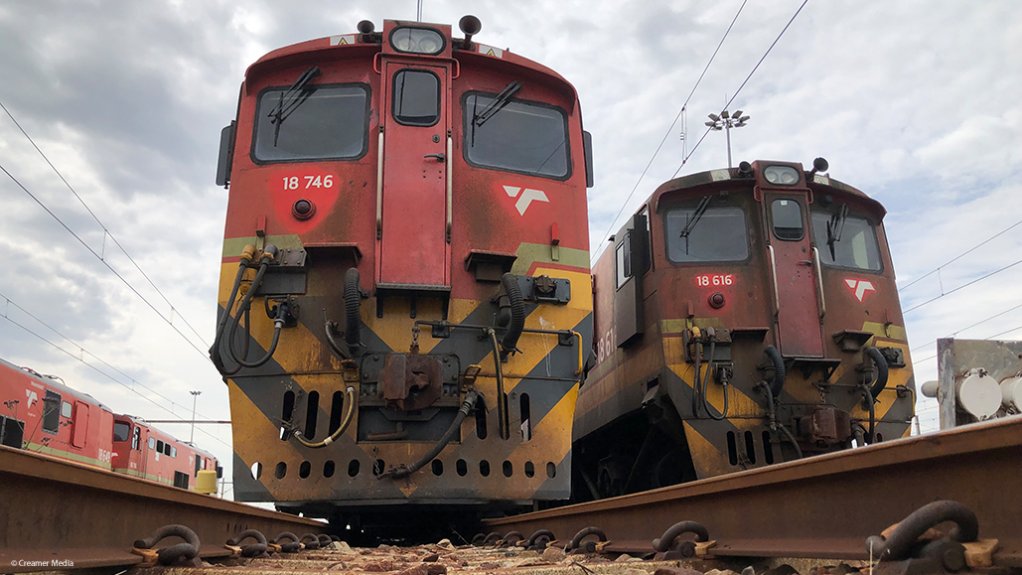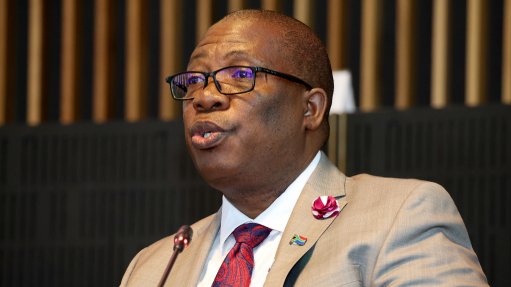Mavuso admonishes Transnet for capitulating to ‘unreasonable’ union demands
Business Leadership South Africa CEO Busisiwe Mavuso has said she was “astounded” to see news last week of State-owned Transnet's capitulation to unions’ strike threats, eventually agreeing to give workers 6% pay rises in each of the next three years.
“This agreement represents a failure of leadership on both sides – militant unions holding the country hostage with strike threats and management caving to their demands without a fight,” she said in her weekly newsletter on June 17.
She noted that, while South African businesses were cutting costs and workers face retrenchment across the economy, Transnet workers will get pay rises that are double the inflation rate, funded by taxpayers who are already struggling to make ends meet.
Mavuso pointed out that inflation is running at 2.7% and the economy is expected to grow by only 1.4% this year.
Amplifying Mavuso’s concern was that the news came mere days after National Treasury had agreed to give Transnet additional guarantees to enable it to manage its huge debt pile.
“In the private sector, the bleak economic outlook is leading to severe belt-tightening. Managers everywhere are having to find ways to save and try to hoard cash to be able to trade through tough conditions.
“Inevitably, some firms are going to fail and workers will find themselves out of a job. Yet, the unions threatened to bring the entire logistics network to a standstill unless their excessive demands were met, showing complete disregard for the economic factors that affect us all,” she said.
Mavuso added that it was even more “shocking” when one considers the role that Transnet plays in perpetuating South Africa’s economic predicament.
“Transnet's poor performance has been a major contributor to our dismal growth outlook,” she said.
Stellenbosch University's Professor Jan Havenga has estimated that Transnet costs the economy about R1-billion every day because of its poor performance in moving goods around the country and out through the ports. “That is equivalent to wiping out the entire annual budget of a midsize municipality every day. It equates to about 5% of GDP.”
“The unions are acting as if we live in a world we haven't seen for 15 years, when growth was running at over 5% and government boasted a budget surplus.
“Instead, we live in a world where [tyre manufacturer] Goodyear Tyres has just let go of over 900 workers after having to shut its 78-year-old plant in the Eastern Cape, affecting thousands more jobs down the value chain; where [beer maker] South African Breweries is engaging with unions about retrenching workers across its operations; where mines across the country are retrenching thousands because they cannot get their output to the markets. In many of these cases, union action at Transnet is a direct contributor to this job carnage,” Mavuso said.
She explained that the failure was twofold. The first failure was the fact that the unions refused to accept performance-linked pay and the second was management's refusal to insist on it.
“If workers were to get increases indexed to Transnet's performance, we could support these. Bonuses could be tied to improvements in volumes shipped through ports and on rail, or specific metrics like international port efficiency rankings, which currently put South Africa's ports among the worst in the world.
“Instead, the unions demanded guaranteed increases regardless of whether Transnet improves its service delivery [or not],” Mavuso said.
She said this represented a toxic dynamic where unions treat the State as an “endless ATM”.
Mavuso pointed out that private-sector unions understood that companies needed to remain viable to protect jobs. However, Transnet's unions continued to make unreasonable demands knowing that management could not afford to have their suboptimal operations interrupted as it would put a further strain on the economy.
“Worse still, they've secured additional job security guarantees in this wage agreement, further limiting Transnet's flexibility to restructure and improve performance.”
“The unions know exactly what they're doing. They understand that by threatening strikes at Transnet, they can hold the entire economy hostage. They know that government will always cave rather than face the economic disruption of a logistics shutdown. This is economic blackmail, pure and simple, and taxpayers are footing the bill while the economy suffers,” Mavuso admonished.
She said the solutions needed for Transnet included private-sector investment and competition. However, as long as militant unions still had the power to veto any meaningful reform through strike threats, she believed that the South African economy would remain trapped in a cycle of poor performance and endless bailouts.
“The unions have made it clear [that] they prefer protecting their members' privileges over the economic wellbeing of the country. The wage settlement shows just how unhelpful these unions can become to South Africa's economic prospects. We need government to finally take a firmer stance.”
“National Treasury must demand that any future bailouts come with strict conditions that break the unions' stranglehold over Transnet's operations. [It] must insist on performance metrics as strict as those facing any private company seeking bailout funds, and the power to override union objections when restructuring is needed,” Mavuso recommended.
She noted that the private sector wanted to partner with Transnet, but that the unions’ actions were not helpful in that they did not support economic recovery.
“Until government finds a way of confronting union militancy at State-owned enterprises, taxpayers will continue subsidising this destructive cycle while our economy stagnates. The unions need to be called upon to contribute to solutions of rebuilding our economy rather than exacerbating its challenges,” Mavuso said.
Article Enquiry
Email Article
Save Article
Feedback
To advertise email advertising@creamermedia.co.za or click here
Announcements
What's On
Subscribe to improve your user experience...
Option 1 (equivalent of R125 a month):
Receive a weekly copy of Creamer Media's Engineering News & Mining Weekly magazine
(print copy for those in South Africa and e-magazine for those outside of South Africa)
Receive daily email newsletters
Access to full search results
Access archive of magazine back copies
Access to Projects in Progress
Access to ONE Research Report of your choice in PDF format
Option 2 (equivalent of R375 a month):
All benefits from Option 1
PLUS
Access to Creamer Media's Research Channel Africa for ALL Research Reports, in PDF format, on various industrial and mining sectors
including Electricity; Water; Energy Transition; Hydrogen; Roads, Rail and Ports; Coal; Gold; Platinum; Battery Metals; etc.
Already a subscriber?
Forgotten your password?
Receive weekly copy of Creamer Media's Engineering News & Mining Weekly magazine (print copy for those in South Africa and e-magazine for those outside of South Africa)
➕
Recieve daily email newsletters
➕
Access to full search results
➕
Access archive of magazine back copies
➕
Access to Projects in Progress
➕
Access to ONE Research Report of your choice in PDF format
RESEARCH CHANNEL AFRICA
R4500 (equivalent of R375 a month)
SUBSCRIBEAll benefits from Option 1
➕
Access to Creamer Media's Research Channel Africa for ALL Research Reports on various industrial and mining sectors, in PDF format, including on:
Electricity
➕
Water
➕
Energy Transition
➕
Hydrogen
➕
Roads, Rail and Ports
➕
Coal
➕
Gold
➕
Platinum
➕
Battery Metals
➕
etc.
Receive all benefits from Option 1 or Option 2 delivered to numerous people at your company
➕
Multiple User names and Passwords for simultaneous log-ins
➕
Intranet integration access to all in your organisation





















